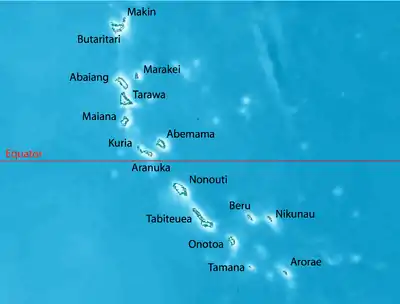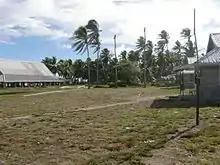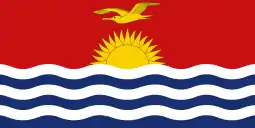Maiana
Maiana is an atoll in Kiribati and is one of the Central Gilbert Islands. Maiana is 44 kilometres (27 mi) south of the capital island of South Tarawa and has a population of 1,982 as of 2015. The northern and eastern sides of the atoll are a single island, whilst the western edge consists of submerged reefs and many uninhabited islets, all surrounding a lagoon. The atoll is 14 kilometres (8.7 mi) long and is very narrow, with an average width of less than 1 kilometre (0.62 mi) and a total land area (including uninhabited islets) of 16.72 square kilometres (6.46 sq mi).[1]
 Map of Maiana | |
 | |
| Geography | |
|---|---|
| Location | Pacific Ocean |
| Coordinates | 0°55′N 173°00′E |
| Archipelago | Gilbert Islands |
| Area | 16.72 km2 (6.46 sq mi) |
| Highest elevation | 3 m (10 ft) |
| Administration | |
| Demographics | |
| Population | 1,982 (2015 Census) |
| Pop. density | 121/km2 (313/sq mi) |
| Ethnic groups | I-Kiribati 99.9% |
Geography


Most of the 2,027 people who live on Maiana live on the main island; the largest village is Bubutei, at the southern tip of the main island, which is home to 489 people or almost a quarter (24%) of the island's total population. The population of Maiana is roughly stable and has been around 2,000 people since 1985.[1]
| Maiana: Population and Land Area | |||
|---|---|---|---|
| Census Area | Population 2010[2] | Land area by islet[2] | Density (people per acre) |
| Tebikerai | 93 | 61.2 acres (25 ha) | 1.5 |
| Tebiauea | 211 | 3,805.6 acres (1,540 ha) | 0.5 |
| Raweai | 214 | ||
| Bubutei | 489 | ||
| Tekaranga | 139 | ||
| Tematantongo | 164 | ||
| Aobike | 110 | ||
| Tebanga | 264 | ||
| Temwangaua | 115 | ||
| Toora | 115 | ||
| Tebwangetua | 65 | ||
| Teitai | 48 | ||
| Uninhabited islets | 0 | 263.5 acres (107 ha) | 0 |
| Maiana total | 2,027 | 4,130.3 acres (1,671 ha) | 0.5 |
Climate change
Many parts of Maiana suffer from coastal erosion, with the villages of Tekaranga and Tematantongo being particularly affected. Drought is another serious concern as the island's limited freshwater supply comes entirely from the shallow freshwater lens, which becomes salty close to the coast especially during drought periods. Like all of the atolls of Kiribati, Maiana is at serious risk from sea level rise, as even small changes in sea level can cause accelerated erosion and threaten infrastructure, agriculture and water supplies.[1][3]
Administration

Maiana is administered by an Island Council based in Tebangetua village. The Maiana constituency elects two representatives to the national House of Assembly in the capital of South Tarawa. Until you 2016, the MPs for Maiana are Dr. Anote Tong and Teiwaki Areieta.[4] Dr. Tong was also the President of Kiribati. His son, Vincent Tong, is elected MP in April 2020. Apart from that, the local people of Maiana also have their ruling system that survive from the past. Unimwane Ruling System (Elders or old men ruling system). All villages from Tebikerai to Bubutei have their unimwane represent their villages to the Unimwane Council Body. This body called Tebau-ni-Maiana (The Crown of Maiana, sometimes called the most upper chamber of the Island). Among all Te Unimwane, they will choose the most aging one (older one) as their Baatua (Head of them). They execute rules of the Island that binding people together to follow. This rules and regulations based on the culture and religious belief of Maiana. For example, Uriam Kauongo was a Baatu before he died.
Myths and legends
There are different stories told as to the creation of Maiana and the other islands in the Gilberts. An important legend in the culture of Maiana is that spirits who lived in a tree in Samoa migrated northward carrying branches from the tree, Te Kaintikuaba, which translates as the tree of life. It was these spirits, together with Nareau the Wise who created the islands of Tungaru (the Gilbert Islands).[Note 1]
History
The island was surveyed in 1841 by the US Exploring Expedition.[7]
Maiana Post Office opened around 1925.[8]
Maiana Ferry Disaster
On 13 July 2009, the vessel Uean Te Raoi II, owned by the Catholic Parish of Maiana and travelling from Bwairiki in Tarawa, capsized and foundered off Maiana with the loss of 35 lives.[9]
Notes
- Sir Arthur Grimble, cadet administrative officer in the Gilberts from 1914 and resident commissioner of the Gilbert and Ellice Islands colony from 1926, recorded the myths and oral traditions of the Kiribati people. He wrote the best-sellers A Pattern of Islands (London, John Murray 1952,[5] and Return to the Islands (1957), which was republished by Eland, London in 2011, ISBN 978-1-906011-45-1. He also wrote Tungaru Traditions: writings on the atoll culture of the Gilbert Islands, University of Hawaii Press, Honolulu, 1989, ISBN 0-8248-1217-4.[6]
References
- "7. Maiana" (PDF). Office of Te Beretitent - Republic of Kiribati Island Report Series. 2012. Retrieved 28 April 2015.
- "Kiribati Census Report 2010 Volume 1" (PDF). National Statistics Office, Ministry of Finance and Economic Development, Government of Kiribati. Archived from the original (PDF) on 2014-08-10.
- Dr Temakei Tebano & others (August 2008). "Island/atoll climate change profiles - Maiana Atoll". Office of Te Beretitent - Republic of Kiribati Island Report Series (for KAP II (Phase 2). Archived from the original on November 6, 2011. Retrieved 28 April 2015.
- "Members of the Parliament of Kiribati for the Ninth Parliament" Archived 2010-06-12 at the Wayback Machine, House of Assembly of Kiribati
- Grimble, Arthur (1981). A Pattern of Islands. Penguin Travel Library. Penguin Books. ISBN 0-14-009517-9.
- Grimble, Arthur (1989). Tungaru traditions: writings on the atoll culture of the Gilbert Islands. Penguin Travel Library. University of Hawaii Press. ISBN 978-0-8248-1217-1.
- Stanton, William (1975). The Great United States Exploring Expedition. Berkeley: University of California Press. pp. 245. ISBN 0520025571.
- Premier Postal History. "Post Office List". Premier Postal Auctions. Retrieved 5 July 2013.
- "Beacon could have saved 33 lives in Kiribati accident". NZ Herald. 15 July 2010.
- Exhibit: The Alfred Agate Collection: The United States Exploring Expedition, 1838-1842 from the Navy Art Gallery
